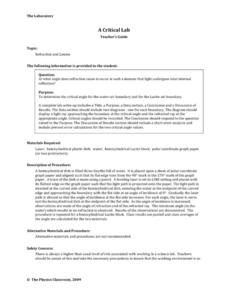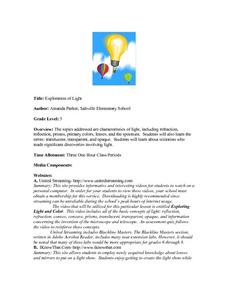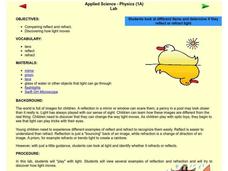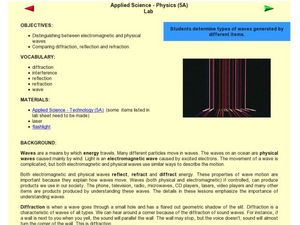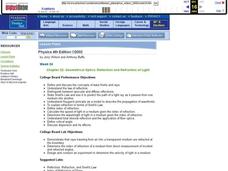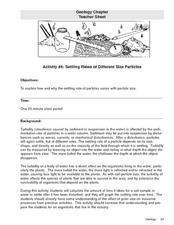Physics Classroom
A Critical Lab
Physics lab groups finagle with laser lights to determine the critical angle of refraction for both water and Lucite. Because there are no detailed steps or an answer key for this enlightening exercise, an inexperienced physics...
Curated OER
Light and Elements
Here is a full-fledged investigation of light waves, the electromagnetic spectrum, and element spectra. Physicists research a scientist that contributed to our understanding of the behavior of light. They take notes on your lecture, and...
Curated OER
Exploration of Light
Fifth graders observe the video, Exploring Light and Color. They access a website to create their own light show. They conduct lab experiments to investigate refraction, reflection,and other light-related topics.
Curated OER
Applied Science - Physics (5B) Post Lab
Fifth graders analyze optical images. in this optical lesson, 5th graders look at how light reflects and refracts. They discuss different types of lenses and how they change the picture that is taken.
Curated OER
Applied Science - Physics Lab
Students define reflection and refraction. In this Physics lesson, students compare a variety of items to find properties of reflection or refraction. Students record their findings.
National Nanotechnology Infrastructure Network
Understanding Wave Motion - Slinky vs. Snaky: Which Spring is Dominant?
Ride the wave to an understanding of refraction! The first in a series of two inquiry-based lessons challenges learners to create transverse waves with two different types of springs. As their wave hits an object, they observe the change...
Curated OER
Light Is Amazing
Students investigate light and its energy. They discuss the properties of light, research how much light the moon absorbed on their birthday on a website, complete a graphic organizer, and create a kaleidoscope.
Curated OER
Fluorescence
Here are some instructions for leading learners through a hands-on activity for investigating ultraviolet radiation. First, introduce them to light and refraction. Then introduce them to the electromagnetic spectrum. Finally, give...
Curated OER
Super Gelatin
Learners measure angles of refraction as the light travels through gelatin. In this experimental lesson students complete a refraction lab and plot their data.
Curated OER
Electromagnetic and Physical Waves
Students compare and contrast electromagnetic and physical waves. In this wave lesson plan, students discover that all waves reflect, refract, and diffract energy. Students work in small groups to experiment with waves and evaluate the...
Curated OER
Geometrical Optics: Reflection and Refraction of Light
Students define and discus the concepts of wave fronts and rays. In groups, they distinguish between specular and diffuse reflections and use Snell's Law to predict the path of light rays. They calculate the speed of light through...
Curated OER
The Color Spectrum: How Does it Work?
Create models of the infrared, visible, and ultraviolet portions of the electromagnetic spectrum. Working in small groups, your class can investigate metric conversions calculations. They will find the length of the waves in nanometers,...
Curated OER
Jell-O Optics
Learners observe an activity with Jell-O to learn about optics. In this investigative lesson students fill out a handout on the activity that helps them to investigate the index of refraction and the speed of light.
Curated OER
Applied Science - Science and Math Post-Lab
Students explore optical illusions. In this Applied Science lesson plan, students view optical illusions and record the data of what they see. Students graph the data that they collect.
Curated OER
Physical Optics: The Wave Nature of Light
Students are introduced to the wave nature of light. In groups, they discuss Young's experiment and how diffraction and interference demonstrate the wave nature of light. Using examples, they show constructive and destructive...
Curated OER
Settling Rates of Different Size Particles
Students discover how and why the settling rate of particles differs with the size of the particles. Using different soil samples, they calculate the amount of time it takes for a sample to settle in water for up to forty minutes. They...
